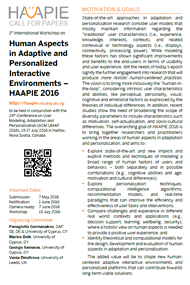Authors
Topics of Interest
Topics of interest include, but are not limited to:
- Human-centered Modeling, Adaptation Methods and Techniques
- Influence of Human Factors on Interactive Systems for Personalization
- Usage of Human Factors for Personalization
- Implicit and Explicit Detection of Human Factors for Personalization
- Human-centered Algorithms for Content Recommendation and Delivery
- Novel Human-centered Interaction Concepts and User Interfaces
- Individual Differences (Personality, Cognition, etc.)
- Synergy of Affective and Human Cognitive Factors
- Modeling Groups and Communities of Diverse Users
- Evaluation of Human Aspects in Adaptation and Personalization
- Personalized Access to Services Content
- User Experience
- Cultural Diversity and Adaptation
- Age-specific Personalization and Adaptation
- Adaptation and Personalization for Users with Special Needs
- User Behavior and Behavior Change
- Context Awareness
- Human Aspects in Personalized Internet of Things Applications
- User-centric Cyber-Physical-Social Adaptive Systems
- Human Aspects in Social Adaptive Robots
- Adaptation and Personalization in Usable Privacy and Security
- Privacy Aspects of Modeling Human Factors in Personalization Systems
Type of Papers
In HAAPIE 2016 we encourage original and relevant contributions focusing on experiences and lessons learned from real-life applications, current state-of-the-art methodologies, challenges tackled and solutions adopted, tools, algorithms, and services in the academic, public or private sector, studies, theories, techniques, and evaluation procedures that could support human-centered adaptation and personalization issues in various levels of interactive environments.
All workshop papers must contain original, previously unpublished, research work adhering the two publication types:
- Full research papers (8-10 pages), proposing new approaches, innovative methods and research findings. They should make substantial theoretical and empirical contributions to the research field.
- Short research papers (4-6 pages), presenting work in progress, lessons learnt, positions, emerging or future research issues and directions on human aspect challenges in the area.
Manuscripts should be formatted using the camera-ready templates (http://www.acm.org/publications/proceedings-template) in the ACM proceedings double-column format.
Submission and Publication
All papers will undergo a peer review process by at least two expert reviewers to ensure a high standard of quality. Referees will consider originality, significance, technical soundness, clarity of exposition, and relevance to the workshop’s topics.
Research papers should be submitted electronically as a single PDF file through the EasyChair submission system (https://easychair.org/conferences/?conf=haapie2016).
Accepted papers will be included in the workshop proceedings published in the ACM UMAP 2016 Extended Proceedings through the green open-access CEUR-WS.org.



